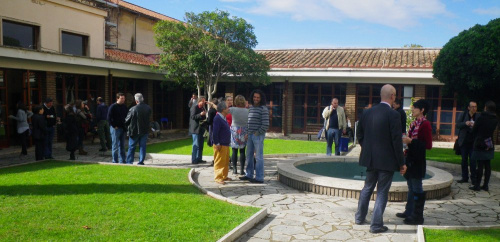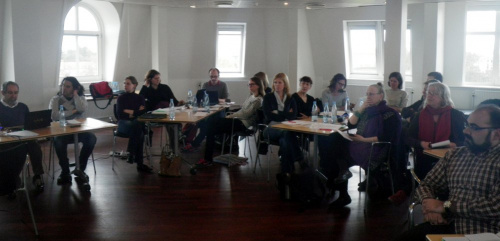Difference between revisions of "CEN TC 372 Workshop Series"
From filmstandards.org
(→Copenhagen, 13-15 April 2011) |
(→Prague, 25-27 May 2011) |
||
| Line 25: | Line 25: | ||
==Prague, 25-27 May 2011== | ==Prague, 25-27 May 2011== | ||
| + | |||
| + | The third workshop will take place from Wednesday, May 25th to Friday, May 27th in the Bio Konvikt - Ponrepo (screening hall of the National Film Archive), Bartolomějská 11, Praha 1. | ||
| + | |||
| + | In addition to the core curriculum, this workshop will include a special session presented by film restorer Anke Wilkening, focusing on policy options when restoring films from dispersed sources. These options will be illustrated by a case study of Fritz Lang's espionage drama ''Spione'' (spies) from 1928. | ||
==Paris, 22-24 June 2011== | ==Paris, 22-24 June 2011== | ||
Revision as of 16:01, 5 May 2011
A series of four workshops has been sponsored by the European Commission (DG Enterprise and Industry) in order to disseminate the results of CEN TC 372 standardization activities.
Materials from the Workshops are being continuously compiled into a TC 372 Workshop Compendium.
Contents
Rome, 25-27 October 2010
This event was hosted by Cineteca Nazionale, the Italian national film archive, and took place on the CSC film academy campus in Cinecittà. It was attended by over 30 participants from 17 countries. Presenters were Detlev Balzer, Ronny Loewy and Marco Rendina from the core TC 372 team, and Maria-Assunta Pimpinelli (Cineteca Nazionale) and Thelma Ross (Academy of Motion Picture Arts and Sciences), two key members of the FIAF Cataloguing and Documentation Commission.
Discussions during the Rome workshop revealed that there is considerable interest in representing relationships that refer to temporal sections of a moving image manifestation. Although this was considered during the standardisation process, it was not included in EN 15907:2010 due to concerns about excessive complexity of the specification. It may be included, however, in the reference implementation as a tentative feature awaiting standardisation in a future version of EN 15907.
Another area of particular interest to participants was the management of element vocabularies. Apart from few exceptions, controlled vocabularies are not in the scope of EN 15907. While some vocabulary can be supplied by the FIAF Cataloguing and Documentation Commission, most controlled terminology will have to be taken from suitable initiatives which will be determined in the course of the remaining workshops. Guest lectures on this subject are planned for the second workshop in April, 2011.
Copenhagen, 13-15 April 2011
This workshop was the second in a series of four dissemination events sponsored by the Enterprise and Industry Directorate of the European Commission. It was hosted by the Danish Film Institute in Copenhagen. Thirty participants from twelve countries attended the event.
Sessions beyond the core curriculum (again presented by Detlev Balzer, Ronny Loewy and Marco Rendina) were devoted to the filmographic vocabulary work done by the European Film Gateway (EFG) Workpackage 3 team. Francesca Schulze and Pernille Schütz reported about results from consolidating vocabulary and authority data from EFG partner archives, while Georg Eckes presented a general overview of the project status. EFG WP 3 is led by the Danish Film Institute.
Discussions repeatedly touched upon the implications of the metadata model for cataloguing. Another issue was that of heterogenous copyright policies among film archives regarding authority data and filmographic records, particularly in the light of the licensing strategy recently proposed by Europeana.
Prague, 25-27 May 2011
The third workshop will take place from Wednesday, May 25th to Friday, May 27th in the Bio Konvikt - Ponrepo (screening hall of the National Film Archive), Bartolomějská 11, Praha 1.
In addition to the core curriculum, this workshop will include a special session presented by film restorer Anke Wilkening, focusing on policy options when restoring films from dispersed sources. These options will be illustrated by a case study of Fritz Lang's espionage drama Spione (spies) from 1928.

